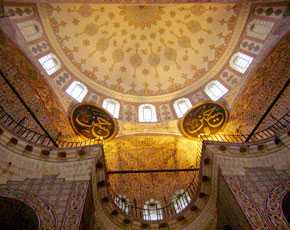ISTANBUL – Daily News with wires
Turkey has welcomed back nearly 2,000 artifacts so far this year following a long struggle to retrieve them from foreign countries after they were smuggled abroad, according to a Culture Ministry official. Turkey is also restructuring the country’s museums to increase their technical capacity and bring them up to contemporary standards, the official adds
Nearly 2,000 historical artifacts that were smuggled abroad over the years have been returned to Turkey in 2011, according to an official from the Culture and Tourism Ministry.
Returning smuggled artifacts back to Turkey is one of the most important activities undertaken by the ministry, according to Melik Ayaz, the president of the ministry’s Excavations and Surveys Department.
Much progress was made on this issue over the past four years, with 1,882 smuggled artifacts returned to Turkey in 2011; around 90 percent of artifacts smuggled abroad came from illegal excavations, he said while speaking at a symposium at İnönü University in the eastern province of Malatya.
“There are far too many illegal excavations in Turkey. There is an international market for this business. There are many forces which operate behind closed curtains that we know nothing about. Our country is extremely wealthy in archaeology and it is very difficult for us to prevent illegal excavations,” he said.
The ministry had encountered difficulties in reclaiming these artifacts due to the requirements made by international laws and regulations, Ayaz said.
A UNESCO convention to which Turkey has been a member since 1970 set forth two conditions that needed to be fulfilled to allow for the return of such artifacts, he said, noting the need to show that a lawsuit was filed at the moment the artifacts were stolen and to provide an inventory record of the artifacts in question.
Unless these two conditions are met, historical artifacts cannot be returned to their countries of origin, he was quoted as saying by Anatolia news agency.
The ministry particularly heeds bilateral cultural agreements on the issue of retrieving stolen artifacts, Ayaz said, adding that while Turkey had cooperated with other countries suffering from the same problem, cultural relations remained limited with countries that unlawfully refused to return Turkey’s stolen artifacts.
“The important point here is to elevate Turkey’s cultural consciousness. Cultural assets are internationally considered as part of humanity’s common heritage. According to our own statutes, they are also considered as state property. That being the case, they are considered as the common property of the public. It is illegal, inhumane and even unethical for an individual to lay claim to these artifacts. That consciousness has to be formed in Turkey,” Ayaz said.
Aim for a bigger and more comprehensive museum
Another significant work undertaken by the Ministry of Culture and Tourism has been upgrading the technical facilities in the country’s museums, Ayaz said.
At the moment, museums are being restructured according to local climactic conditions, Ayaz said.
“The ministry has serious work ongoing to redesign, display and organize pieces according to historic features. Hopefully, in the coming season, our museums will be able to gain a position where they can fulfill all the requirements of what modern museums demand,” he said.
Turkey has nearly 100 public museums and nearly 100 museums owned by nongovernmental organizations, Ayaz said.
But the existing museums are inadequate in comparison to Turkey’s historical wealth, Ayaz said.
“We aim to form regional museums with greater capacity and facilities. In this context, apart from normal museums, sometimes it might be appropriate to set up museums at those locations where an archaeological excavation is taking place. Many of our pieces are being kept in storage spaces due to a lack of places where they can be exhibited and classified.”
via Nearly 2,000 smuggled historical artifacts returned to Turkey – Hurriyet Daily News and Economic Review.

